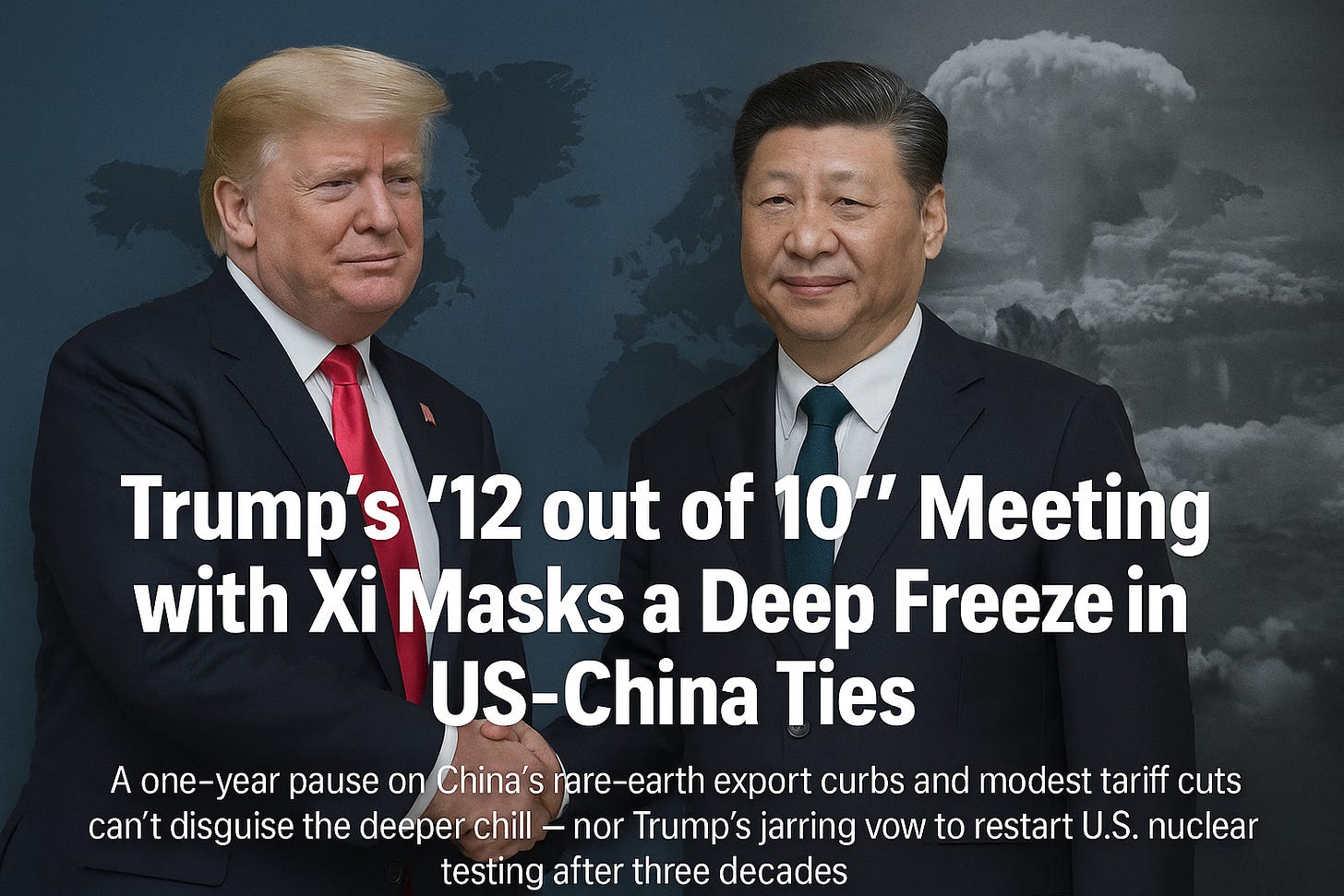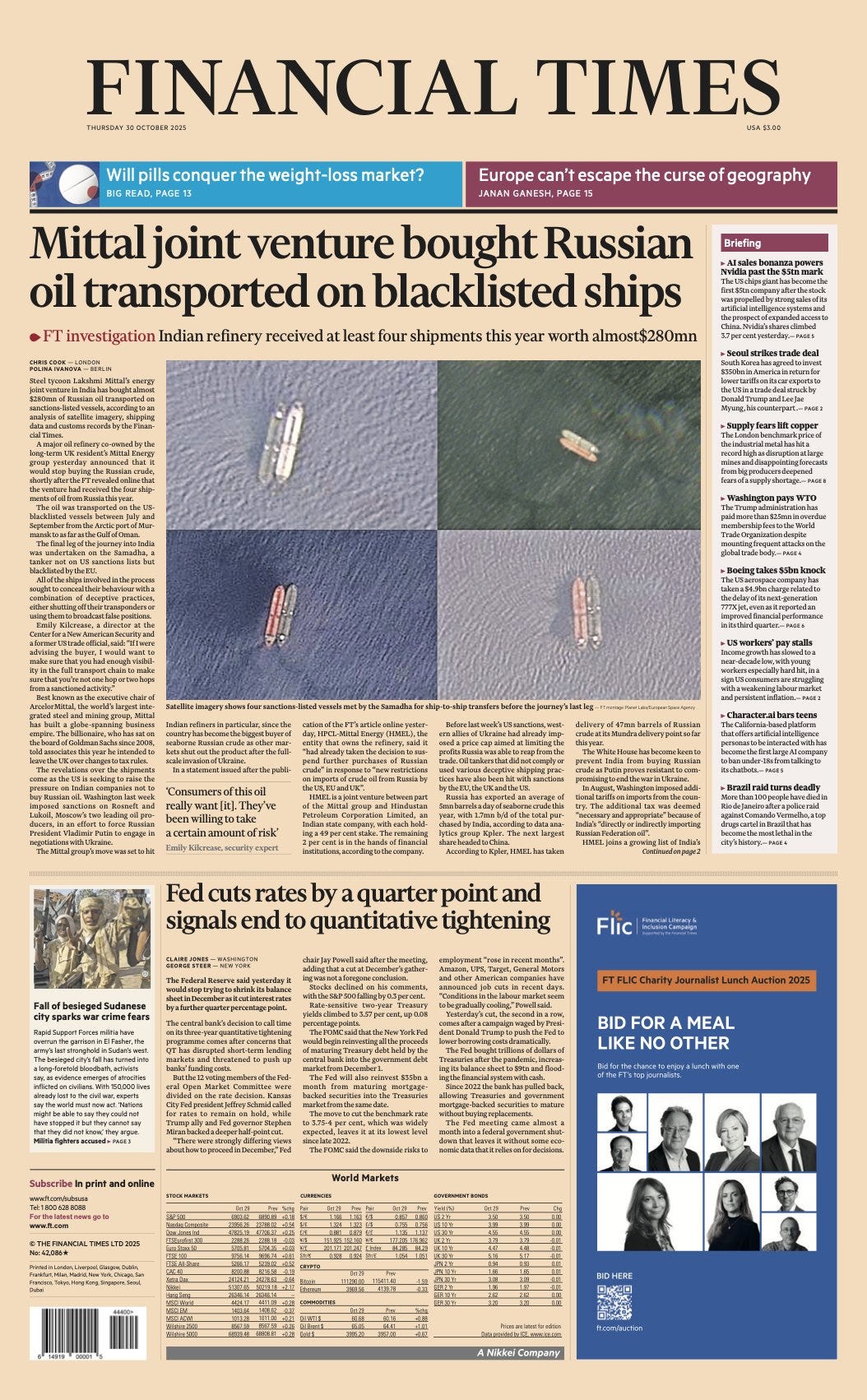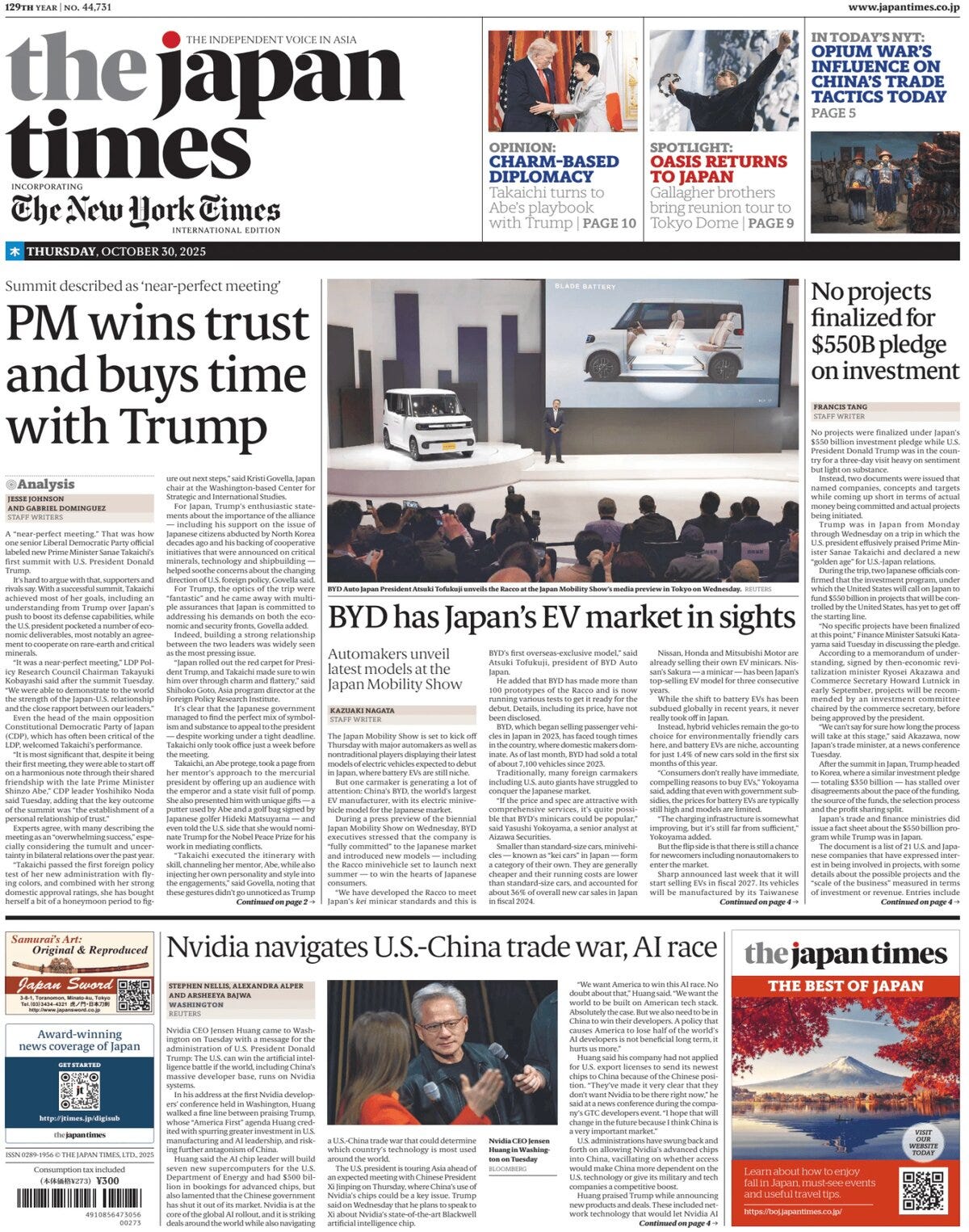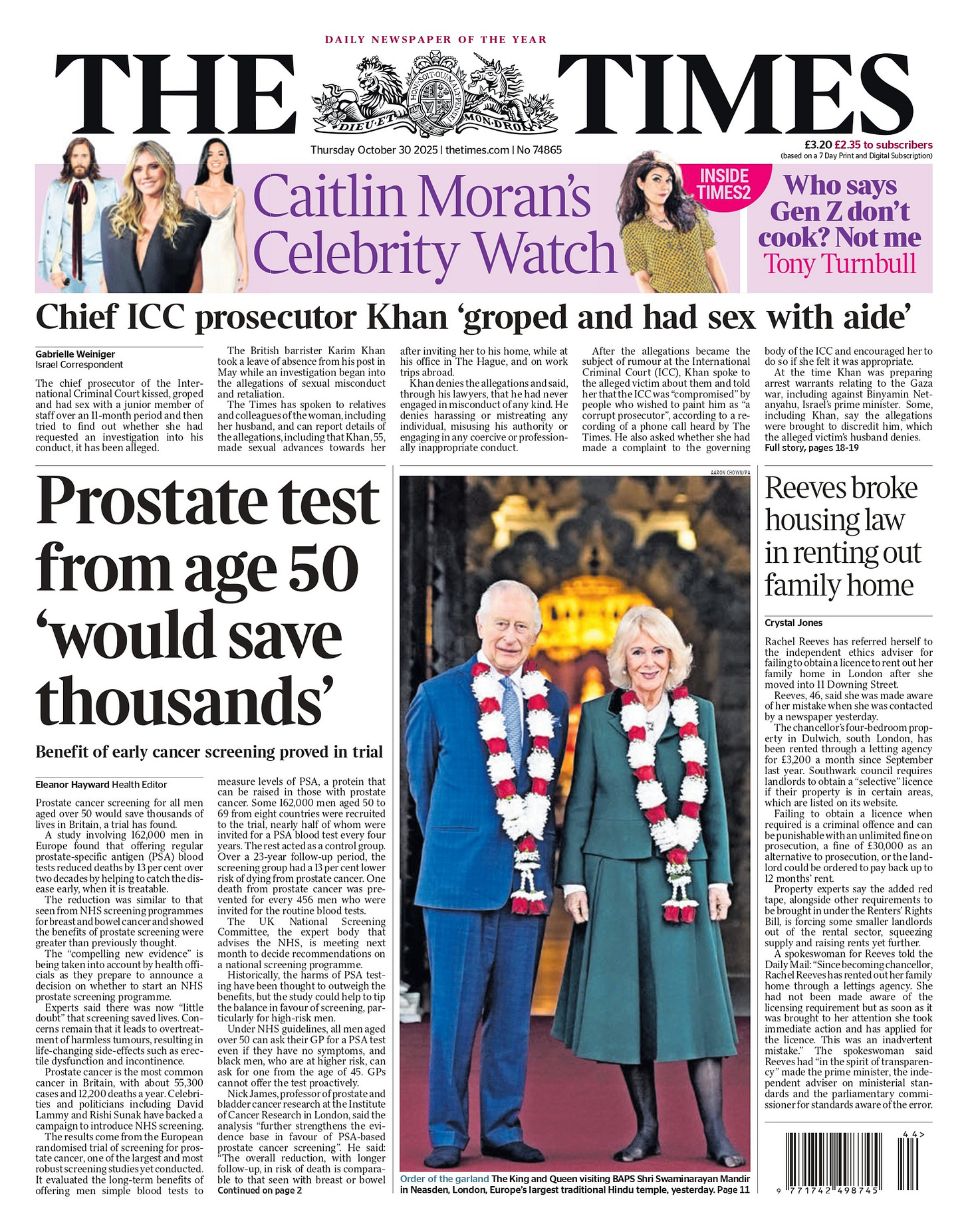🕰 Trump Has the Watches. Beijing Has the Time
Behind the smiles in South Korea: no new deals, muted Chinese optics, and a U.S. president racing to claim victory as the clock quietly ticks Beijing’s way.
HOT TAKE ANALYSIS:
For all the talk of “friendship” and “mutual prosperity,” the Xi–Trump summit in South Korea felt less like détente and more like delay. Trump’s self-graded “12 out of 10” meeting produced few deliverables beyond a one-year truce on rare-earth exports — a temporary pressure valve for industries rattled by Beijing’s leverage over critical minerals. His decision to halve tariffs on Chinese goods (in return for China doing more to control fentanyl trafficking) is headline-grabbing but economically marginal.
More jarring was Trump’s declaration, mid-flight back to Washington, that the U.S. will resume nuclear weapons testing — a move sure to unnerve allies and embolden hardliners in Moscow, Tehran and Pyongyang.
Meanwhile, both leaders skirted any mention of Ukraine, with Trump saying, bizarrely, that “sometimes you gotta let them fight.” Prior to the meeting, Kyiv and its allies had urged Trump to press Xi to curb Beijing’s support for Moscow. But as I told CNN anchor Fredricka Whitfield: “It ain’t gonna happen.” Beijing sees no strategic gain in pressuring Putin - and every advantage in letting Washington shoulder the diplomatic burden.
For Beijing, the optics were clear: project calm, concede little, and buy time. For Washington, it was about theatrics and transactionalism. The bigger picture remains unchanged — mutual suspicion, divergent worldviews, and a shared understanding that, for now, neither side can afford a real fight.
Beijing’s studied calm contrasted sharply with Trump’s eagerness to declare success. It brought to mind a saying — not truly Chinese, though it feels as if it could be: “You may have the watches, but we have the time.” Few maxims better capture the long game China continues to play.
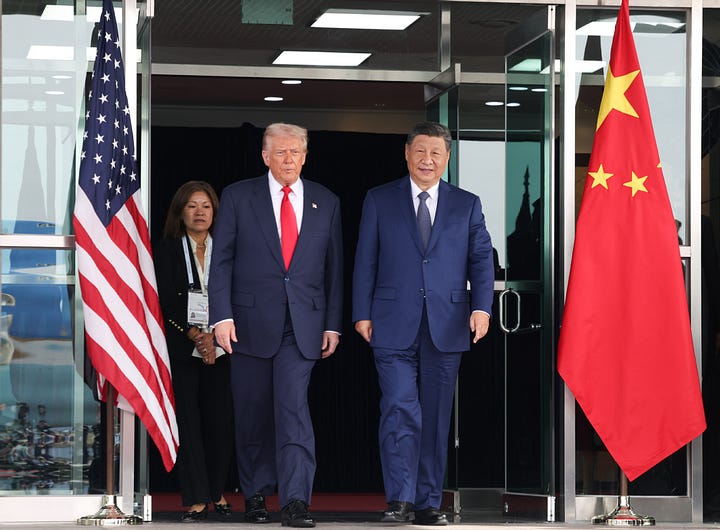
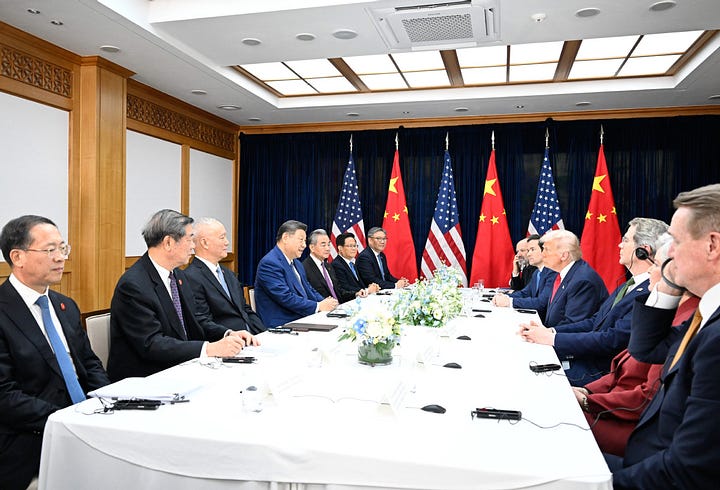
President Trump said on Thursday that China had agreed to postpone for a year strict new controls on its supply of critical rare earth metals, potentially relieving a major pressure point that has caused alarm in global supply chains. Separately, Mr. Trump said he would cut in half the 20 percent tariffs he had imposed on Chinese goods to pressure China to do more to control fentanyl trafficking. The reduction announced on Thursday brings overall tariffs on Chinese goods to around 47 percent from 57 percent, he said. Mr. Trump made the announcement as he flew back to Washington after a summit meeting with China’s top leader, Xi Jinping, that had been expected to focus on trade issues but was overshadowed by Mr. Trump’s announcement that the United States would resume nuclear weapons testing after more than three decades. While Mr. Trump greeted Mr. Xi warmly ahead of their roughly 90-minute meeting at a military base in South Korea, the mood was tenser than it had been when he met the leaders of Japan, South Korea and Malaysia earlier on his trip. Neither man mentioned nuclear weapons or testing. The Chinese government’s readout of their meeting did not mention any new trade agreements. The readout said that Mr. Xi had told Mr. Trump that both leaders should avoid the “vicious cycle of mutual retaliation.” It also said Mr. Trump would travel to China next year and that he had invited Mr. Xi to the United States. China’s Commerce Ministry later said that the two sides had agreed on a one-year extension to a truce they had put in place earlier this year after a flurry of tit-for-tat escalations drove up tariffs on each other’s imports to more than 100 percent - NYT
Chinese state media portrayed the bilateral meeting between Xi and Trump as lowkey and made no mention of any new agreements. It said that Xi “underlined the need to ensure the steady movement forward of China-US relations” during his meeting. “Our two countries are fully able to help each other succeed and prosper together. China and the US should be partners and friends. That is what history has taught us and what reality needs,” Xi said, as quoted by the official China Daily. Xi said he is ready to continue working with Trump to “build a solid foundation for China-US relations and create a sound atmosphere for the development of both countries”. Xi noted that Trump is very enthusiastic about settling various regional hotspot issues, and China has also been promoting peace talks to resolve various conflicts.
Whether this meeting shifts anything structurally in US-China relations remains to be seen, wrote Nirmal Ghosh, a former foreign correspondent and US news bureau chief. “The US’ baseline view remains that China is a threat to its global dominance, and China resents America’s tariffs and containment strategies. But both sides at least agree on one thing - that neither can afford a real fight, whether over trade or anything else.” - CNA
Speaking of conflicts, Trump said that he also discussed the war in Ukraine launched by Russia in February 2022, saying that he and Xi agreed to “work together.” He said: “We agree that the sides are locked in fighting and sometimes you gotta let them fight I guess. But we’re going to work together on Ukraine.” Prior to the meeting, Ukraine and its allies called on Trump to pressure Xi Jinping over China’s backing of Russia. The meeting came a week after Washington announced sanctions on two major Russian oil companies. China is the single-largest buyer of Russian crude and has been a vital lifeline for Moscow’s energy industry amid Russian President Vladimir Putin’s grinding war in Ukraine - RFE/RL
“I guess on the scale from 0 to 10, with 10 being the best, I would say the meeting was a 12” - Donald Trump after his meeting with Xi Jinping
Indian refiner HPCL-Mittal Energy said on Wednesday it has stopped purchasing Russian oil, shortly after the Financial Times reported the company bought Russian oil transported on blacklisted ships. Last week, the U.S. and Europe imposed a raft of fresh sanctions on Russian oil, with Washington targeting the country’s top oil producers Lukoil and Rosneft. This has prompted Indian refiners to pause buying Russian oil as they await clarity. The company said in the statement, “HMEL had already taken the decision to suspend further purchases of Russian crude upon recent announcements of new restrictions on imports of crude oil from Russia by the United States, European Union and United Kingdom, pending receipt of any outstanding orders.” India has become the biggest buyer of seaborne Russian oil sold at a discount after Western nations shunned purchases and imposed sanctions on Moscow for its 2022 invasion of Ukraine. The Financial Times report said it was unclear whether the refiner, which is partly owned by steel tycoon Lakshmi Niwas Mittal, was aware of the vessels being used - Reuters
Sudan’s military government has ordered two senior officials at the UN’s World Food Programme (WFP) to leave the country amid widespread famine sparked by a gruelling civil war that erupted in April 2023. The WFP said directors of its Sudan operation were declared “personae non grata” and told to go within 72 hours, without explanation. The decision comes days after the paramilitary Rapid Support Forces (RSF), captured the key city of el-Fasher in Darfur from the military after an 18-month siege, which included a food blockade. The WFP said the expulsions came a “pivotal time” as humanitarian needs in Sudan had “never been greater with more than 24 million people facing acute food insecurity”. Two-and-a-half years of fighting between the army and the RSF escalated on Sunday, when the RSF seized el-Fasher in the western region of Darfur. There are now fears for the fate of the estimated 250,000 people in the city, many from non-Arab communities. Reports of atrocities, including mass-killings, have been mounting since the city fell - BBC
Demonstrators clashed with police in Cameroon and Tanzania following disputed elections in both countries, the latest signs of growing voter dissatisfaction with electoral processes in Africa. Protesters in Cameroon took to cities across the country days after President Paul Biya secured an extension to his 43-year rule in a process experts say was marred by irregularities. Meanwhile, police in Tanzania’s biggest city fired gunshots and tear gas against protestors who criticized yesterday’s election that was preceded by the disappearance and detention of leading opposition politicians. The protests reflect a worrying trend across sub-Saharan Africa: According to a recent poll by Afrobarometer, a pollster, just 39% of respondents trust their national electoral commission - Semafor
Emmanuel Macron is now France’s least-popular president in the past 50 years, according to a new poll published Thursday. The Verian Group survey, which polled 1,000 people and was published in the conservative daily Le Figaro, shows Macron’s approval rating at a staggering 11 percent — tying the lowest figure ever recorded by the firm. The previous record-holder was Macron’s direct predecessor and former boss, François Hollande, who hit 11 percent in late 2016, shortly before announcing that he would not seek a second presidential term. By Verian’s measure, Macron and Hollande now share the crown of France’s least popular president since the early 1970s, when the pollster and its predecessors began conducting this monthly survey for Le Figaro. Other polling institutes have reached similar conclusions about Macron’s slump following his unpopular decision to raise the retirement age and the months of political deadlock triggered by his decision to dissolve parliament following a far-right triumph in the 2024 European election - Politico


